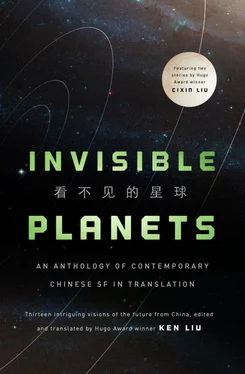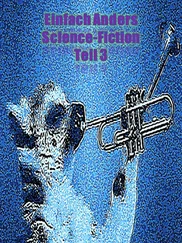But when the two players in the game, the two sides, have concluded their business, all sacrifices become justified—whether it’s the Neorats or us. I think again of Black Cannon in the woods, and shudder.
“Don’t mention what you saw,” the Drill Instructor says. I know he means the religion of the rats, Black Cannon’s grin, Pea’s death. These things aren’t part of the official story. They’re meant to be forgotten.
I ask the nurse, “Will the migrating rats pass this city?”
“In about half an hour. You should be able to see them from the park in front of the hospital.”
I ask her to take me there. I want to say good-bye to my foes, who never existed.
Two fists are before my eyes, bright sunlight reflecting from the backs of the hands.
“Left or right?”
I see myself reaching out with a child’s finger, hesitating, and pointing to the one on the left. The fist flips, opens. Empty.
The fists disappear and reappear.
“One more chance. Left or right?”
I point to the one on the right.
“You’re sure? Want to change your mind?”
My finger hesitates in the air, waving left, then right, like a swimming fish.
“Final answer? Three… two… one.”
My finger stops on the left.
The fist flips, opens. Other than the bright sunlight, the hand is empty.
* * *
A dream?
I open my eyes. The sun is bright white and hurts my eyes. I’ve been dozing in this Naxi-style [3] The Naxi are an ethnic group living in parts of southwestern China. Lijiang, Yunnan Province, is a center of Naxi culture.
courtyard for who knows how long. I haven’t felt this comfortable in such a long time. The sky is so fucking blue. I stretch until my bones crack.
After ten years, everything here has changed. The only thing that remains the same is the color of the sky.
Lijiang, [4] The Lijiang region is famous for the pristine beauty of Jade Dragon Snow Mountain and the Old Town of Lijiang, an ancient city of orderly waterways and bridges and a UNESCO World Heritage Site.
I’m back. This time, I’m a sick man.
* * *
Twenty-four hours ago, I had a multiplicity of identities: an office drone with a strict routine, the master of a gray Ford, the prospective owner of a moldy apartment tucked into a hidden fold of the city, a debt-ridden parasite, etc.
Now I’m just a patient, a patient in need of rehabilitation.
It’s the fault of that damned mandatory physical exam. On the last page of the report were the words, “PNFD II (Psychogenic Neural-Functional Disorder II).” Translated into words normal people can understand, they say that I’m messed up and I must take two weeks off to rehabilitate.
My face flushed, I asked my boss whether I could be exempted. I felt the stares of everyone in the office burning into the back of my neck. Schadenfreude. They were delighted that the “boss’s pet” was shown to be human after all, weak in the head, collapsing under the stress.
I shuddered. That’s office politics for you.
The boss spoke slowly, methodically. “You think I want this? I have to pay for your mandatory vacation! People working at other companies can’t get rehab even if they need it. But the new labor law requires it of us. Our company is a proper globalized business; we have to set an example.… Anyway, if you get worse, your disease will turn into neurosyphilis and infect the rest of us. Better that you leave now, yes?”
Ashamed, I left the boss’s office and cleaned out my desk. I ignored the stares. Keep on looking, you neurosyphilitic assholes. I’ll be back in two weeks, and we’ll see who gets to be assistant manager at the end of the year.
On the airplane, I listened to the snores around me, unable to fall asleep. I’d been dealing with insomnia for more than a month. Actually, I’d been dealing with a lot of things: upset stomach, forgetfulness, headaches, fatigue, depression, loss of libido… maybe it really was time for me to rest for a while.
I flipped through the in-flight magazine. The pictures of the tourist sights around Lijiang were so beautiful they almost seemed fake.
Ten years ago, I had nothing and no cares. Ten years ago, Lijiang was a paradise for those who liked to exile themselves from civilization. (Or to put it less pretentiously, that was where young people who fancied themselves “artists” slept with one another.) Ten years ago, I carried everything I owned on my back (still had some muscles then). A map of the ancient city in my pocket, I wandered through it from morning till midnight, chatted with every woman who was alone, fell asleep to the accompaniment of song and alcohol.
Now I’m back. I have a car, a house—everything a man should have, including erectile dysfunction and insomnia. If happiness and time are the two axes of a graph, then I’m afraid the curve of my life has already passed the apex and is on its inexorable way down to the bottom.
* * *
I stay still, thinking of nothing. Sunlight falls from the tops of the high walls into the yard, which smells of Chinese mahogany. I don’t know how much time has passed. My watch, mobile, and any other gadget capable of displaying time have been taken away by the staff of the rehabilitation center.
The ancient city has no computers and no TV. But some of the inhabitants have decided to rent out the space on their foreheads and chests. Tiny LCDs are embedded into their skin, showing all kinds of ads twenty-four hours a day. Like I said, this is no longer the Lijiang I knew.
Strangely, my desire to get better as soon as possible so that I can get back to the office is fading in the sunlight, like the fading smell of the Chinese mahogany.
My stomach growls, once. I decide to go find something to eat. My stomach seems the only way I have left to tell time—oh, also my bladder and the shifting lights in the sky.
The slate-lined street has few pedestrians—this part of the city is reserved for the use of the rehabilitating patients. There are many stray dogs, however: fat, thin, all kinds.
On the flight here I heard a joke. Serious economic criminals, in addition to the death penalty and life imprisonment, can now be sentenced to a third kind of punishment: becoming experimental subjects for consciousness transfer operations in Lijiang so that they can be turned into dogs. Normally, because these experiments often fail, no one volunteers. But the idea of living in Lijiang is so attractive—even as a dog—that many have jumped at the opportunity.
Seeing how these dogs are so obsequious before pretty girls and so nervous before city inspectors, I almost think the joke is reportage.
I finish a bowl of soy chicken, find a café, and sit with a cup of black coffee. I flip through a few books I’ve always been meaning to read (and will never finish) and think about “the meaning of life.”
Is this how you get better? Without any physical therapy, medication, special diet, yoga, yin-yang dynamics, or any other kind of professional care? Is this the meaning of the slogan plastered all over the rehabilitation center: “Healthy Minds, Happy Bodies”?
I have to admit it: I have a great appetite; I’m sleeping well; I’m relaxed; I feel better even than I did ten years ago.
Even my nose, which has been stuffed up for several weeks, can now pick out the fragrance of sachets in a coffee shop. Wait. Sachets?
I lift my head. A girl in a dark green dress is sitting across from me, holding a drink that smells delicious and looking at me with a big smile on her face. This is like the hook for some French film, I think, or maybe a dream, either sweet or terrifying.
Читать дальше












